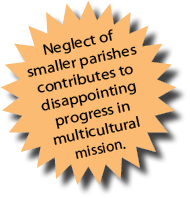Why Small Churches Are Ideal for Multicultural Outreach
 2×2 is polishing the crystal ball. Looking into the future, we see the small urban church as having the best potential to implement multicultural ministry.
2×2 is polishing the crystal ball. Looking into the future, we see the small urban church as having the best potential to implement multicultural ministry.
Here are the reasons why:
- Location, location, location
Small churches sit in the middle of changing neighborhoods. If multicultural ministry is the goal, the church needs to be where the cultures are! - Heritage
Small churches remain close to their heritage which often had their roots in immigrant ministry. Suburban churches are likely to have had a later historic start and missed that experience. - Size
Smaller groups of people make it easier for newcomers to become involved in influential ways more quickly. They will not be lost in a crowd. - Ability to Adapt
Small groups can change more easily and quickly with the right leadership. There are fewer minds to change. Leaders are easy to identify and motivate. - Personal Touch
Guests stand out in a small church. Visitors readily greet them. This has been very pronounced in our Ambassador visits. Smaller churches meet and greet — before church, sometimes during church, and after church. Medium-sized churches often assume somebody else knows you and may say hello. Larger churches have an invitation to sign the guest book printed in the bulletin.
Small Churches Have the Best Shot of Leading the Way — Except
- Many small urban churches are targeted for closure.
- Their ministries have often been neglected with minimal professional leadership provided. Leaders are often assigned as “caretakers,” waiting for congregations to get discouraged and close. While they are providing “palliative care” the neighborhoods around them are changing with no outreach efforts attempted.
- Interim ministries (the new normal) slow the process of change. While congregations are in a year or more of evaluation/assessment limbo, neighborhoods keep changing. When the congregation finally calls a pastor, they are starting over once again with probably another year before outreach can be attempted. That’s two years of a congregation’s history and resources spent focusing on relationship with a pastor — not outreach. With an average length of pastorate being just a few years, that’s a high percentage of a congregation’s time and resources focused on self.
- Often, resources are depleted during years of maintaining a status quo and doing NO outreach. People are afraid to spend money, attempting to preserve assets for their current ministry as long as possible.
- Assets of small neighborhood churches are sometimes eyed by the denomination.
- Attitudes toward small churches, fostered by hierarchy, make them unpopular places for clergy to seek calls. What energetic pastors want to hold the hands of a congregation that has been labeled caretaker ministries with closure in the near future?
 If denominations want to advance multicultural ministry, they must take a fresh look at the neighborhoods where multicultural ministry is most needed and find ways to make ministry possible.
If denominations want to advance multicultural ministry, they must take a fresh look at the neighborhoods where multicultural ministry is most needed and find ways to make ministry possible.
The first challenge to the Church is to reverse the negative attitudes towards small churches as not worth the attention of church leaders. These attitudes squander the resources available for multicultural ministry.
This type of ministry requires special training. Seminaries must stress evangelism skills. The current scenario many small churches face is pastors who charge the laity to do this outreach. The laity have even less training than pastors! This is not working!
New ideas for teaming ministry talent (both lay and clergy), church agencies and resources must be explored.
Failure to address these conditions over the course of many years has created distrust between congregations and regional bodies. Reports from church consultants and online polls are consistently close in numbers. According to them, two thirds of church members have lost confidence in their denominational leaders with an additional 10% or more not sure. This should set off the sirens among leadership circles, but they have been slow to recognize the problems.
Rebuilding trust is a good place to start.
